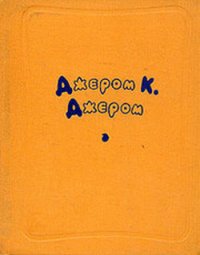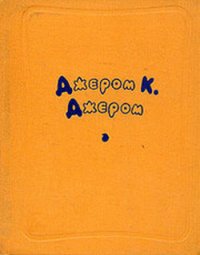My First Book - Jerome Jerome Klapka (читать книги онлайн полностью без регистрации .TXT) 📗
My home (or what served for it) was now on the fourth floor of New Court, in Lincoln's Inn, and one morning Lovell came purring and blowing and steaming (the good fellow was a twenty-stone man) into my lofty nest. He had re-read my novel coming up in the train. 'Well?' I asked, nervously. 'It's magnificent,' he said. That was all the favourable criticism he offered. All save one practical and tangible bit. 'We'll give you 100l. for the serial right of the story for the Weekly'.

He offered one unfavourable criticism. 'The death of your hero will never do,' he said. 'If you kill that man Ralph, you'll kill your book. What's the good? Take no more than the public will give you to begin with, and by-and-by they'll take what you give them.' It was practical advice, but it went sorely against my grain. The death of the hero was the natural sequel to the story; the only end that gave meaning, and intention, and logic to its motif. I had a strong predisposition towards a tragic climax to a serious story. To close a narrative of disastrous events with a happy ending it always seemed necessary to turn every incident into accident. That was like laughing at the reader. Comedy was comedy, but comedy and tragedy together was farce. Then a solemn close was so much more impressive. A happy end nearly always frayed off into rags and nothingness, but a sad one closed and clasped a story as with a clasp. Besides, a tragic end might be a glorious and satisfying one, and need by no means be squalid and miserable. But all these arguments went down before my friend's practical assurance: 'Kill that man, and you kill your book.'
With much diffidence I altered the catastrophe and made my hero happy. Then, thinking my work complete, I asked Mr. Theodore Watts (a friend to whose wise counsel I owed much in those days) to read some 'galley' slips of it. He thought the rustic scenes good, but advised me to moderate the dialect, and he propounded to me his well-known views on the use of patois in fiction. 'It gives a sense of reality,' he said, 'and often has the effect of wit, but it must not stand in the way.' The advice was sound. A man may know over much of his subject to write on it properly. I had studied Cumbrian to too much purpose, and did not realise that some of my scenes were like sealed books to the general reader. So once again I ran over my story, taking out some of the 'nobbuts' and the 'dustas' and the 'wiltas.'
My first novel was now written, but I had still to get it published. In my early days in London, while trying to live in the outer court of a calling wherein the struggle for existence is keenest and bitterest and cruellest, I conceived one day the idea of offering myself as a reader to the publishers. With this view I called on several of that ilk, who have perhaps no recollection of my early application. I recall my interview with one of them. He was sitting at a table when I was taken into his room, and he never once raised his head from his papers to look at me. I just remember that he had a neck like a three-decker, and a voice like a peahen's. 'Well, sir?' he said. I mentioned the object of my visit. 'What can you read?' 'Novels and poems,' I answered. 'Don't publish either—good day,' he said, and I went out.
But one of the very best, and quite, I think, the very oldest of publishers now living, received me differently. 'Come into my own room,' he said. It was a lovely little place, full of an atmosphere that recalled the publishing house of the old days, half office, half study; a workshop where books might be made, not turned out by machinery. I read many manuscripts for that publisher, and must have learned much by the experience. And now that my novel was finished I took it to him first. He offered to publish it the following year. That did not suit me, and I took my book elsewhere. Next day I was offered 50l. for my copyright. That was wages at the rate of about four shillings a day for the time I had been actually engaged upon the work, sweating brain and heart and every faculty. Nevertheless, one of my friends urged me to accept it. 'Why?' I asked. 'Because it is a story of the past, and therefore not one publisher in ten will look at it.' I used strong language, and then took my novel to Chatto & Windus. Within a few hours Mr. Chatto made me an offer which I accepted. The book is now, I think, in its fifteenth edition.
The story I have told of many breakdowns in the attempt to write my first novel may suggest the idea that I was merely serving my apprenticeship to fiction. It is true that I was, but it would be wrong to conclude that the writing of a novel has been plain sailing with me ever since. Let me 'throw a crust to my critics,' and confess that I am serving my apprenticeship still. Every book that I have written since has offered yet greater difficulties. Not one of the little series but has at some moment been a despair to me. There has always been a point of the story at which I have felt confident that it must kill me. I have written six novels (that is to say, about sixteen), and sworn as many oaths that I would never begin another. Three times I have thrown up commissions in sheer terror of the work ahead of one. Yet here I am at this moment (like half-a-dozen of my fellow-craftsmen), with contracts in hand which I cannot get through for three years. The public expects a novel to be light reading. It may revenge itself for occasional disappointments by remembering that a novel is not always light writing.
Let me conclude with a few words that may be timely. Of all the literary cants that I despise and hate, the one I hate and despise the most is that which would have the world believe that greatly gifted men who have become distinguished in literature and are earning thousands a year by it, and have no public existence and no apology apart from it, hold it in pity as a profession and in contempt as an art. For my own part, I have found the profession of letters a serious pursuit, of which in no company and in no country have I had need to be ashamed. It has demanded all my powers, fired all my enthusiasm, developed my sympathies, enlarged my friendships, touched, amused, soothed, and comforted me. If it has been hard work, it has also been a constant inspiration, and I would not change it for all the glory and more than all the emoluments of the best-paid and the most illustrious profession in the world.
'THE SOCIAL KALEIDOSCOPE'
By George R. Sims

MY first book hardly deserved the title. I have only a dim remembrance of it now, because it is one of those things which I have studiously set myself to forget. I was very proud of it before I saw it. After I had seen it, I realised in one swift moment's anguish the concentrated truth of the word vanity as applied to human wishes. Hidden away in the bottom corner of an old box, which is not to be opened until after I am dead, that first book lies at the present moment; that is to say, unless the process of decay, which had already set in upon the paper on which it was printed, has gone on to the bitter end, and the book has disappeared entirely of its own accord.

Before that book was published, I used to lie awake at night and fancy how great and how grand a thing it would be for me to see a book with my name on the cover lying on Smith's bookstalls, and staring me in the face from the booksellers' windows. After it was published, I felt that I owed Messrs. Smith & Sons a deep debt of gratitude for refusing to take it, and my heart rejoiced within me greatly that the only booksellers who exhibited it lived principally in old back streets and half-finished suburban thoroughfares.




